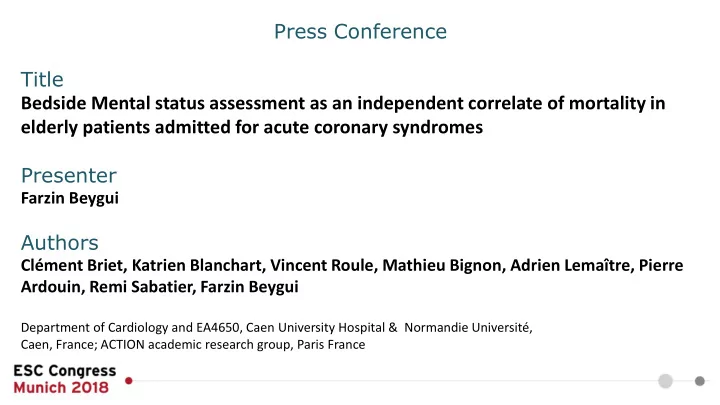

Press Conference Title Bedside Mental status assessment as an independent correlate of mortality in elderly patients admitted for acute coronary syndromes Presenter Farzin Beygui Authors Clément Briet, Katrien Blanchart, Vincent Roule, Mathieu Bignon, Adrien Lemaître, Pierre Ardouin, Remi Sabatier, Farzin Beygui Department of Cardiology and EA4650, Caen University Hospital & Normandie Université, Caen, France; ACTION academic research group, Paris France
Background Age is associated with: • High rates of ACS: >30% of patients admitted for ACS > 75 y • High risk of mortality after ACS • > 50% of in-hospital death occurs in > 75 y • Compared to those <85, the risk of mortality is 3 to 9 times higher after age 85. • High prevalence of dementia and in-hospital delirium/confusion. • A significant association between atherosclerosis and dementia has been previously reported supporting a possible link between coronary artery disease and mental status.
Background The Mini-Mental State Examination (MMSE) and the Confusion Assessment Method (CAM) are is used on routine basis for the screening and the assessment of the severity of dementia and confusion respectively in clinical and research settings.
Purpose & Methods: Purpose • to assess the impact of mental status on outcomes after ACS in elderly patients. Methods: • Prospective, open, ongoing cohort of patients ≥ 75 years old admitted for an ACS (STEMI, NSTEMI or unstable angina) to the cardiology department of the University Hospital of CAEN. • Cognitive impairment was defined in the presence of any of the following criteria: • Abnormal CAM • Age and education level-weighted MMSE < 25th percentile • Follow-up was completed at 3 months and 1 year in all patients • The primary outcome of the study was total mortality at 1-year follow-up. • The secondary endpoints assessed at hospital discharge and 3 months follow-up: • Death, Rehospitalization, Major bleeding (BARC type ≥3 ).
Results 1: demographics and 1 year survival in 600 patients > 75 y Variable No Cog impairment Cog impairment p N= 428 (71%) N=172 (29%) Age, y 82 ± 4.7 82.7 ± 4.7 0.12 Male gender 243(56.8) 92(53.4) 0.45 Primary school 313(73.5) 107(62.6) 0.008 STEMI, 147(34.3) 69(40.2) 0.18 BMI, kg.m -2 26.6 ± 4.4 25.6 ± 4.8 0.02 Killip Class>1 118(27.7) 68(38.7) 0.0042 GRACE score 172.5 ± 26.4 184.7 ± 27.9 <0.0001 CRUSADE score 39.5 ± 21.7 43.6 ± 14.6 0.0007 MMSE score 26.07 ± 2.47 19.30 ± 4.50 <0.0001 Abnormal CAM 0(0) 19(10.9) <0.0001 Revascularization 309(72.2) 100(58.1) 0.0008
Results 2:Outcomes No� cognitive� Cognitive� Unadjusted� OR(CI)� p� Adjusted� OR(CI)� p� Outcome� All� patients� impairment� impairment� N=600� N=428� N=172� � � � � � � � � � In-hospital� � � � Bleeding� BARC ≥ � 3,� n� (%)� 27(4.5)� 14(3.3)� 13(7.5)� 2.49(1.14;� 5.43)� 0.02� 2.2(1.008;� 4.9)� 0.048� Death,� n� (%)� 16(2.7)� 8(1.9)� 8(4.6)� 2.93(1.047;� 8.22)� 0.04� 3.4(0.9;12� .5)� 0.065� 3� months� follow-up� � � � � Death,� n� (%)� 51(8.9)� � 24(5.8)� � 27(16.2)� � 3.21(1.79;� 5.75)� <0.0001� 2.57(1.34;� 4.9)� 0.0047� Cardiovascular� eath(%)� 34(5.9)� 15(3.6)� 19(11.6)� 3.5(1.7;� 7.03)� <0.0001� 3(1.4;� 6.4)� 0.0045� Rehospitalization(%)� � 180(31.4)� 116(28)� 64(40)� 1.70(1.16;� 2.50)� 0.0061� 1.6(1.09;� 2.4)� 0.016� For� cardiovascular� causes,� n� (%)� 107(18.7)� 67(16.2)� 40(25)� 1.72(1.10;� 2.68)� 0.016� 1.6(1.02;� 2.6)� 0.04� For� recurrent� ACS,� n� (%)� 54(9)� 36� (7)� 18(10.3)� 1.27(0.70;� 2.30)� 0.42� 1.29(0.7;� 2.37)� 0.41� For� heart� failure,� n� (%)� 85(14.9)� 51(12.4)� 34(21.5)� 1.90(1.18;� 3.07)� 0.008� 1.8(1.07;� 3.05)� 0.03� Bleeding� BARC ≥ 3,� n� (%)� 44(7.3)� 32(7.5)� 12(6.9)� 0.85(0.41;� 1.71)� 0.64� 0.86(0.42;� 1.7)� 0.7� 1� year� follow-up� � � � HR(CI)� � � � Death,� n� (%)� 92(15.3)� 43(10.5)� 49(28.6)� 3.24(2.14;� 4.9)� <0.0001� 2.35(1.53;� 3.58)� 0.0001� � Models adjusted on age, sex, ST-elevation myocardial infarction versus other presentation, revascularization, GRACE Score , Killip class. Bleeding models were adjusted on the CRUSADE score
Conclusions & key points Our study shows that in an elderly population (≥75 y) admitted for ACS • #30% of patients suffer from cognitive impairment defined by reduced MMSE or delirium detected by CAM. • Such condition is associated with higher risks of mortality, bleeding and re- hospitalization. • The relationship with outcomes is independent of other major correlates of such events. • The bedside assessment of mental status early after admission allows further identification of patients at risk in an already high risk population and may be considered by physicians on routine basis in such patients. • Our results warrant further studies to assess whether the detection of cognitive impairment and the subsequent specific management may lead to improved outcome in the elderly ACS population
Recommend
More recommend